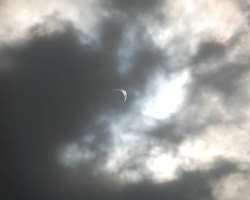Nigeria witnesses partial eclipse of the sun

A partial eclipse of the Sun has been witnessed on Sunday in Nigeria confirming the forecast by the National Space Research and Development Agency (NASRDA).
Between the hours of 1:00pm to 16:00pm, local time, residents in Abuja, Nigeria's capital, experienced a flush of sunlight and mild darkness.
Some Abuja residents gathered at the NASRDA office in Abuja to experience the eclipse, which the agency had described as an astronomical phenomenon.
With their eyes searching the skies, no fewer than 500 students of public and private schools across the country observed the partial solar eclipse at the National Space Research and Development Agency (NASRDA), Abuja.
As the solar eclipse started in Abuja at exactly 1.03 p.m., NASRDA provided the students and other Nigerians with instruments, including eclipse shades to observe the eclipse.
The Director General of the agency, Dr. Saidu Mohammed, told reporters that the eclipse would not affect satellite communication.
He advised Nigerians to remain calm, as there was nothing mystical about it. Speaking with the News Agency of Nigeria (NAN), the Supervising Minister for Science and Technology, Mrs Omobola Johnson, said the students were invited to motivate them to develop interest in the study of science and technology.
'We invited these students to boost their interest in the studying of science and technology which is the bedrock for industrialisation of any nation.
'That is why we are using this medium to encourage you to develop interest in studying science and technology, particularly astronomy and space science,' Johnson said.
Johnson, represented by the Permanent Secretary in the ministry, Mrs Rabi Jimeta, said the occurrence of the partial solar eclipse revealed that space technology was working in Nigeria.
In Lagos and Ibadan, people were also excited as they gathered in different places to observe the eclipse which brought sudden darkness to some parts of the two cities.
In Lagos, some of the residents from Egbeda, Command Road, Agege and Oke-Aro, said that they had not expected a partial eclipse, but were excited that they could see changes in the sun.
A resident of Egbeda, Mrs Titi Francis, told NAN that at about 1.10 p.m., the weather became dark.
'Around 1.10p.m., I noticed that the cloud became dark as if it was about to rain. I did not really see it like an eclipse, but I am excited about it because I heard it was really total in some places,' she said.
In Kaduna, the eclipse was noticed at about 2.00 p.m. and there was calmness.
People were seen going about their normal businesses peacefully as the sunny day suddenly became a little darker between 1.45 p.m. to 2.30 p.m., while few Muslim clerics were heard saying prayers silently.
Some residents however, said they were not aware of what had happened as only those who heard of the eclipse from the media on Saturday, yesterday, remained vigilant and sighted the eclipse on Sunday in Kaduna.
A solar eclipse is an astronomical event that occurs when the moon passes between the sun and the earth and partially or totally blocked the sun.
Scientists at the National Aeronautics and Space Administration (NASA), a United States government agency responsible for the nation's civilian space programme and for aeronautics and aerospace research, had earlier predicted that the moon and sun will team up to create a rare event Sunday.
